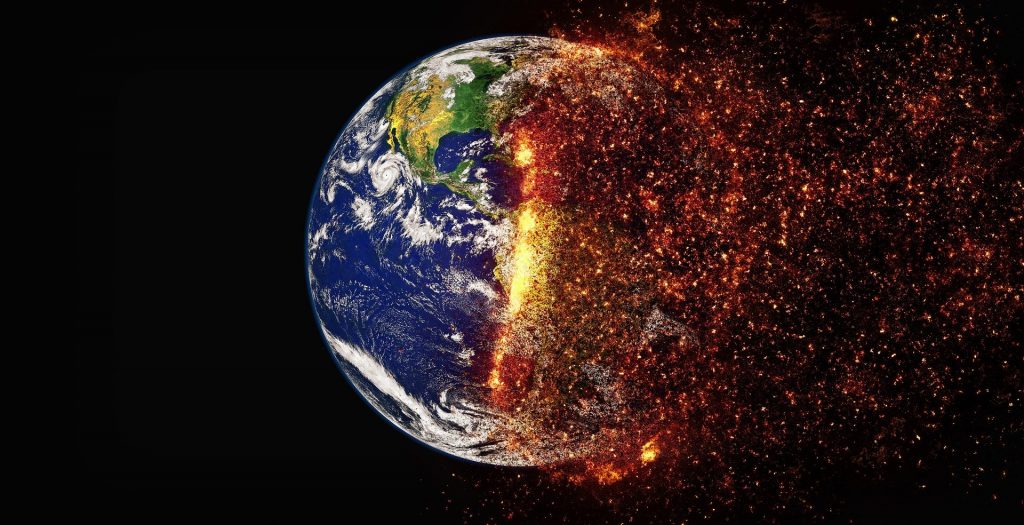Area Companies Backtrack on Climate Change
We Energies, Dairyland Power, Enbridge Energy plan major new investments in fossil fuels.
The latest report from the United Nations Intergovernmental Panel on Climate Change (IPCC) reiterated what we already know: We need to be taking swift, bold action to address climate change. If we don’t, the consequences are dire.
The report called it a “code red for humanity.” While Gov. Tony Evers and President Joe Biden have committed to action on climate change and are taking steps to move forward, energy companies are moving forward with proposals to build much more fossil fuel infrastructure.
Choosing clean energy over fossil fuels isn’t a novel idea. Utilities around the country are doing it and right here in Wisconsin, our own Alliant Energy is doing it. After announcing plants to shut down their last two coal plants in Wisconsin, they have announced plans for huge investments in clean energy, especially solar.
However, most are ignoring Alliant Energy’s lead. There are several new proposals that double down on the fossil fuels that got us into this mess in the first place.
- WEC Energy Group (the parent company of We Energies and Wisconsin Public Service) is moving forward with plans to build two small gas plants in Rothschild and Kronenwetter in the central part of the state and two gas storage facilities that will cost customers $470 million.
- Dairyland Power Cooperative is pushing forward for permission to build a large new gas plant in Superior, despite serious legal challenges. Dairyland also wants to pay for the plant in part with a loan from the Biden administration, despite President Biden’s climate commitments.
- Finally, Enbridge Energy Company is trying to grow its oil pipeline network in the Midwest. It is currently working to construct the Line 3 replacement pipeline, an enormous oil pipeline that would pump an additional 400,000 barrels of dirty, carbon-intensive tar sands oil into Wisconsin every day. One study found that allowing the Line 3 pipeline would be equivalent to building fifty coal plants.
Water protectors, led by indigenous women, are actively fighting to protect the land and water as well as treaty rights. Over 700 people have been arrested on the frontlines. If successful in getting Line 3 constructed and pumping oil, Enbridge is likely to pursue another pipeline through the heart of Wisconsin.
At the same time, Enbridge is digging its heels in to do everything it can to invest more money in the decrepit, 68-year-old Line 5 pipeline that goes through northern Wisconsin and the Straits of Mackinac. Currently, it is violating the Michigan order to shut down the pipeline, trying to force the Bad River Band of the Lake Superior Chippewa to host the pipeline, and asking the Evers administration for permission to build an expansion of the pipeline.
On the surface, these various proposals may seem really different, but they have a lot in common. They are expensive, irresponsible, hurt our communities and are bad for the climate. Communities near fracking and tar sands extraction zones face high rates of water contamination, air pollution and cancer.
These proposals do the opposite. Last year, the Governor’s Task Force on Climate Change affirmed this fact, stating that “avoiding fossil fuel infrastructure is one way to prevent a carbon lock-in, where policies, infrastructure, and investments made in the past or present commit us to high-carbon emissions in the future, even when alternative technologies are available.” The report also recognized “the continued placement of infrastructure adjacent to Indigenous, Black, and other communities of color.”
Building fossil fuel infrastructure while trying to address climate change is like stopping for an errand when you’re already late or going on a shopping spree when on a budget. It’s counterproductive and nonsensical. Based on the IPCC report, we can’t afford to be counterproductive. We can’t stop climate change by investing in fossil fuels and we need Wisconsin regulators to reject these fossil fuel proposals accordingly.
We can’t stop climate change by investing in fossil fuels was originally published by the Wisconsin Examiner.
Elizabeth Ward is the director of the statewide branch of the Sierra Club.
Op-Ed
-
Wisconsin Candidates Decry Money in Politics, Plan to Raise Tons of It
 Dec 15th, 2025 by Ruth Conniff
Dec 15th, 2025 by Ruth Conniff
-
Trump Left Contraceptives to Rot; Women Pay the Price
 Dec 8th, 2025 by Dr. Shefaali Sharma
Dec 8th, 2025 by Dr. Shefaali Sharma
-
Why the Common Council’s Amended Budget is Good Policy for Milwaukee
 Nov 20th, 2025 by Alds. Marina Dimitrijevic and Russell W. Stamper, II
Nov 20th, 2025 by Alds. Marina Dimitrijevic and Russell W. Stamper, II






















A few thoughts on Elizabeth Ward’s excellent piece. First, four decades ago, at the behest of the political right, the Republican Party’s core message became, “don’t trust government.” Remember Ronald Reagan’s “nine words.” Regulations were a form of communism, taxes were theft, everyone except “the businessman” was a dummy, often a “faceless bureaucrat.”
It all worked. Government was discredited, and, in the process, corporate and financial America, along with groups of plutocrats, took control of government at every level, all three branches and both political parties. Cranking up racial animus helped to mask this takeover. Getting control by “the people” back will be very difficult. It will be labeled “socialism” or “wokeism.” It won’t be. It will be democracy at work to secure a decent future for the generations to come.
Next, another disastrous development of these decades was the entrenchment of the corporate belief that the only value was “shareholder value.” Destruction of the environment was just an externalizable cost, not our concern. CEO compensation and survival is now based on this singular value. Here, charitable giving and “community engagement,” as opposed to racial hostility, masked the reality of what was happening. Anyone who pointed out the consequences of this “value” was a “job killer” or a “socialist” who never had to make a payroll.
Finally, a small piece of useful evidence, I think. As someone who is not a scientist and doesn’t even play one on television, it has always struck me that Milwaukee is a very windy city. (It turns out this is what is known as a true fact.) What has also struck me is that there is only one wind turbine near the shore in Milwaukee. Why is that? Milwaukee and Wisconsin would seem to have enormous wind-generating potential.
In the end, it is almost certain that it is going to take an organized citizens’ revolt to do what is needed to meet the existential threat that climate change poses. It won’t be easy, and it is going to involve frontal challenges to both parties and a message to the judiciary that their legitimacy is at stake. Thanks to Elizabeth Ward for illustrating what is happening and what we are up against.
So what can we do about it?